120 Basic Chinese Words and Phrases to Help You Survive

Hey there, language adventurers! Are you ready to embark on a journey to the vibrant world of Mandarin Chinese? Get your linguistic passports ready because we’re about to dive headfirst into 100 essential but basic Chinese words and phrases that will help you navigate through China with ease. From greetings to survival phrases and everything in between, this comprehensive guide will transform you into a master communicator. So, let’s roll up our sleeves and get started!
Greetings and introductions — basic Chinese phrases
They say the first impression is everything, and mastering greetings and introductions is the key to making a positive impact. In this section, we’ll dive into the art of saying hello, introducing yourself, and engaging in polite conversations. With these essential basic Chinese phrases, you’ll charm the locals, break the ice, and set the stage for meaningful interactions throughout your Chinese journey. Here are the essential basic Chinese words for greetings and introductions.
1. 你好 (nǐ hǎo) — Hello
The ultimate icebreaker in Chinese. Master this, and you’re off to a great start!
你好,我是凯特。
Nǐhǎo, wǒ shì Kate。
Hi, I’m Kate
2. 您好 (nín hǎo) — Hello (formal)
When you want to show respect or greet someone older or in a professional setting.
您好,欢迎光临。
Nín hǎo, huānyíng guānglín.
Hello, welcome.
3. 早上好 (zǎoshang hǎo) — Good morning
Rise and shine! Start your day with a sunny greeting.
老师,早上好啊。
Lǎoshī, zǎoshang hǎo a.
Good morning, teacher.
4. 晚上好 (wǎnshàng hǎo) — Good evening
When the sun goes down, this phrase will make you sound like a true local.
晚上好,欢迎大家来参加我的生日派对。
Wǎnshàng hǎo, huānyíng dàjiā lái cānjiā wǒ de shēngrì pàiduì.
Good evening and welcome everyone to my birthday party.
5. 再见 (zàijiàn) — Goodbye
Time to bid adieu, but not before impressing them with your linguistic skills.
爸爸,我要去上学了,再见。
Bàba, wǒ yào qù shàngxuéle, zàijiàn.
Dad, I’m going to school. Goodbye.
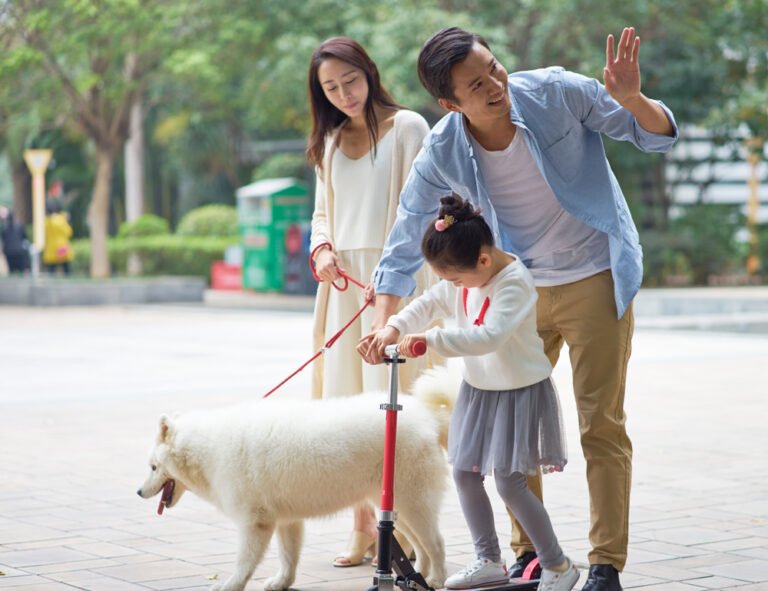
6. 名字 (míngzi) — Name
When you want to exchange names and make new friends.
你好,请问你叫什么名字?
Nǐ hǎo, qǐngwèn nǐ jiào shénme míngzì?
Hi, what’s your name?
7. 很高兴认识你 (hěn gāoxìng rènshì nǐ) — Nice to meet you
A warm and friendly way to greet new acquaintances, although you may want to choose different ways to say nice to meet you depending on the setting and who you’re talking to.
我是凯特,很高兴认识你。
Wǒ shì kǎitè, hěn gāoxìng rènshí nǐ.
I’m Kate. Nice to meet you.
8. 请问 (qǐngwèn) — Excuse me
Perfect for grabbing someone’s attention or asking for directions.
请问洗手间在哪里?
Qǐngwèn xǐshǒujiān zài nǎlǐ?
May I know where the restroom is?
Related Reading: Greetings in Chinese: Why Your Teachers Are Wrong
Basic phrases for survival
Survival mode: activated! In this section, we’ll equip you with some essential basic Chinese phrases to help you navigate everyday scenarios. From expressing gratitude to seeking help, understanding and making yourself understood will be a piece of cake. Master these basic Chinese phrases for saying yes and no, and more survival essentials. So, gear up and get ready to handle any situation that comes your way with confidence and a touch of Mandarin flair.
9. 谢谢 (xièxiè) — Thank you
Gratitude is universal, and this phrase will earn you countless smiles.
谢谢你的帮助。
Xièxiè nǐ de bāngzhù.
Thank you for your help.
10. 不客气 (bú kèqì) — You’re welcome
When you want to graciously accept gratitude and make others feel appreciated. Of course, there are plenty of ways to say you’re welcome in Chinese, depending on who you’re talking to and what you’re trying to convey.
A: 谢谢你的帮助。
Xièxiè nǐ de bāngzhù.
Thank you for your help.
B: 不客气。
Bú kèqì.
You’re welcome.
11. 对不起 (duìbuqǐ) — Sorry
Oops, did you accidentally step on someone’s foot? Apologize like a pro! There are lots of ways to say sorry in Chinese, but you can’t go wrong with the classic 对不起.
对不起,我忘了回复你的邮件。
Duìbùqǐ, wǒ wàngle huífù nǐ de yóujiàn.
Sorry, I forgot to reply to your email.
12. 没关系 (méi guānxi) — It’s okay
When someone apologizes to you, be forgiving and respond with this soothing phrase.
A: 对不起,我忘了回复你的邮件。
Duìbùqǐ, wǒ wàngle huífù nǐ de yóujiàn.
Sorry, I forgot to reply to your email.
B: 没关系。
Méi guānxi.
It’s okay.
13. 是 (shì) — Yes
The key to agreeing and nodding your head in approval.
A: 今天是星期一吗?
Jīntiān shì xīngqí yī ma?
Is it Monday today?
B: 是。
Shì.
Yes.
14. 不是 (bùshì) — No
Use this when you want to express disagreement or simply say “no.” Check out the many different ways you can say “no” in Chinese.
A: 这个是苹果吗?
Zhège shì píngguǒ ma?
Is this an apple?
B: 不是。
Bùshì.
No.
15. 可能 (kěnéng) — Maybe
When you want to add an element of uncertainty to a conversation.
今天起床晚了,可能要迟到了。
Jīntiān qǐchuáng wǎnle, kěnéng yào chídàole.
I got up late today. Maybe I’ll be late.
16. 明白 (míngbai) — I understand
Show your comprehension skills with this handy phrase.
我终于明白你说的话了。
Wǒ zhōngyú míngbái nǐ shuō dehuàle.
I finally understand what you are saying.
17. 不明白 (bù míngbai) — I don’t understand
When the conversation gets a bit tricky, don’t be afraid to ask for clarification.
我不明白你为什么要离开成都。
Wǒ bù míngbái nǐ wèishéme yào líkāi chéngdū.
I don’t understand why you want to leave Chengdu.

18. 请帮助我 (qǐng bāngzhù wǒ) — Please help me
A life—saving phrase in case you find yourself in a bind.
我需要你的帮助,请帮助我,可以吗?
Wǒ xūyào nǐ de bāngzhù, qǐng bāngzhù wǒ, kěyǐ ma?
I need your help. Can you help me, please?
19. 我迷路了 (wǒ mílù le) — I’m lost
If your sense of direction fails you, use this phrase to get back on track.
进入森林一小时后,我发现我迷路了。
Jìnrù sēnlín yī xiǎoshí hòu, wǒ fāxiàn wǒ mílùle.
An hour into the forest, I realized I was lost.
20. 我想去… (wǒ xiǎng qù…) — I want to go to…
Insert the desired location, and voila! You have a handy travel phrase.
世界那么大,我想去看看。
Shìjiè nàme dà, wǒ xiǎng qù kàn kàn.
The world is so big and I want to see it.
Related Reading: Best Resources for Learning Chinese
Numbers and counting
Who said numbers were boring? In this numerical expedition, we’ll unravel the mysteries of counting with some basic Chinese words for numbers. From basic numbers to larger quantities, you’ll learn how to navigate prices, ask about quantities, and impress your friends with your mathematical prowess. Get ready to unlock the power of numbers and witness the beauty of the Chinese numerical system. Here are the must-know basic Chinese words for numbers and counting.
21. 一 (yī) — One
Counting starts here! Impress your friends by counting to a hundred in no time.
我家养了一只小猫咪。
Wǒ jiāyǎngle yī zhǐ xiǎo māomī.
I have a little kitten at home.
22. 二 (èr) — Two
The next step towards numerical mastery.
第二只小鸟也飞走了。
Dì èr zhǐ xiǎo niǎo yě fēi zǒule.
The second bird also flew away.
23. 十 (shí) — Ten
A milestone on your path to numerical greatness.
再过十天就要过年了。
Zàiguò shí tiān jiù yào guòniánle.
The Chinese New Year will be here in ten days.
24. 一百 (yībǎi) — One hundred
Reach the zenith of counting with this phrase.
我的钱包里只有一百元现金。
Wǒ de qiánbāo lǐ zhǐyǒu yībǎi yuán xiànjīn.
I only have one hundred dollars in cash in my wallet.
25. 多少 (duōshao) — How much/many
When you want to inquire about quantities or prices.
你们班一共有多少位同学啊?
Nǐmen bān yīgòng yǒu duōshǎo wèi tóngxué a?
How many students are there in your class?
26. 两个 (liǎng gè) — Two (when counting objects)
Watch out for the special rule when counting objects in Chinese!
我有两个苹果,你要吃吗?
Wǒ yǒu liǎng gè píngguǒ, nǐ yào chī ma?
I have two apples, do you want to eat them?
27. 三十 (sānshí) — Thirty
Learn the pattern and count on well into the thirties!
时间过得真快,我今年已经三十岁了。
Shíjiānguò dé zhēn kuài, wǒ jīnnián yǐjīng sānshí suìle.
Time flies so fast, I am already thirty years old this year.

28. 一千 (yīqiān) — One thousand
For those big numbers that make your head spin.
你听过一千零一夜的故事吗?
Nǐ tīngguò yīqiān líng yī yè de gùshì ma?
Have you heard the story of One Thousand and One Nights?
29. 亿 (yì) — One hundred million
Impress your friends with a glimpse into the vastness of the Chinese numerical system.
我定了一个小目标,比如说先去挣一个亿。
Wǒ dìngle yīgè xiǎo mùbiāo, bǐrú shuō xiān qù zhēng yīgè yì.
I set a small goal, for example, earning 100 million first.
30. 零 (líng) — Zero
The hero that saves us from the perils of empty pockets.
冬天零下几度的天气好冷啊!
Dōngtiān língxià jǐ dù de tiānqì hǎo lěng a!
It’s so cold in winter with temperatures of several degrees below zero!
Related Reading: Numbers in Chinese: How to Count And More
Directions and transportation
Lost in translation? Fear not! This section will be your compass in the vast sea of directions and transportation. From navigating the streets to finding your way around public transportation, you’ll learn how to ask for directions, understand common signs and confidently explore the fascinating landscapes of China. So, let’s embark on a journey where getting lost is not an option.
31. 左 (zuǒ) — Left
When you want to turn left and avoid taking a wrong turn.
我的左手拉着你的右手。
Wǒ de zuǒshǒu lāzhe nǐ de yòushǒu.
I’m holding your right hand with my left hand.
32. 右 (yòu) — Right
The counterpart to the left, it’ll guide you to the correct path.
我的右手边站在一位漂亮的女士。
Wǒ de yòushǒu biān zhàn zài yī wèi piàoliang de nǚshì.
A beautiful lady is standing on my right.
33. 前 (qián) — Front/Ahead
Keep moving forward, and don’t forget to enjoy the view.
一直往前走,不要回头。
Yīzhí wǎng qián zǒu, bùyào huítóu.
Keep moving forward and don’t look back.
34. 后 (hòu) — Back/Behind
When you need to describe something that’s located behind you.
后来,我终于明白,你并不爱我。
Hòulái, wǒ zhōngyú míngbái, nǐ bìng bù ài wǒ.
Later, I finally understood that you don’t love me.
35. 直走 (zhí zǒu) — Go straight
The most straightforward direction of all!
沿着这条路,直走大概十分钟就到了。
Yánzhe zhè tiáo lù, zhí zǒu dàgài shí fēnzhōng jiù dàole.
Follow this road and walk straight for about ten minutes.
36. 地铁站 (dìtiě zhàn) — Metro station
An essential phrase for urban adventurers.
早上六点,地铁站就开门了。
Zǎoshang liù diǎn, dìtiě zhàn jiù kāiménle.
At six o’clock in the morning, the subway station opened.
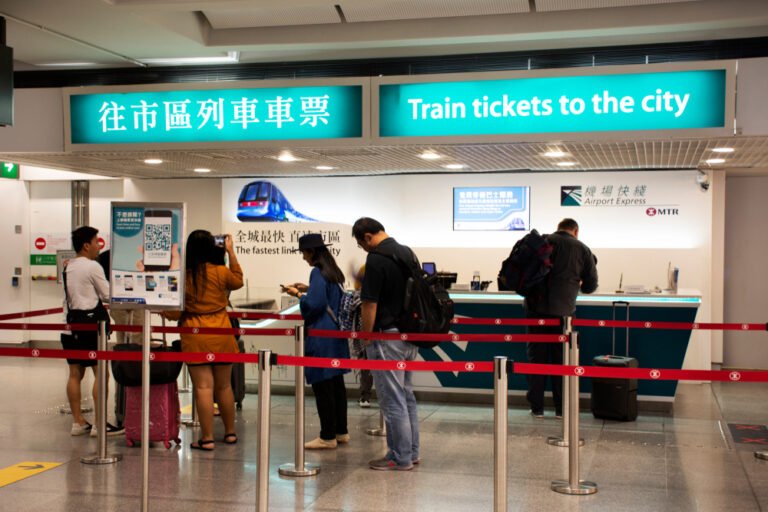
37. 公交车 (gōngjiāo chē) — Bus
Hop on board and explore the city like a true local.
我出行不喜欢搭公交车,喜欢搭地铁。
Wǒ chūxíng bù xǐhuān dā gōngjiāo chē, xǐhuān dā dìtiě.
I don’t like taking buses when traveling, I like taking the subway.
38. 火车站 (huǒchē zhàn) — Train station
The gateway to endless adventures.
我得提前去火车站候车。
Wǒ dé tíqián qù huǒchē zhàn hòuchē.
I have to go to the train station in advance to wait for the train.
39. 飞机场 (fēijī chǎng) — Airport
The place where dreams take flight.
飞机场里停满了飞机。
Fēijī chǎng lǐ tíng mǎnle fēijī.
The airport is full of planes.
40. 出口 (chūkǒu) — Exit
Find your way out of mazes (and labyrinthine shopping centers).
大商场一般都有好几个出口。
Dà shāngchǎng yībān dōu yǒu hǎojǐ gè chūkǒu.
Large shopping malls usually have several exits.
Related Reading: SMART Goals for Learning Chinese
Food and dining
Prepare your taste buds for a culinary extravaganza! In this section, we’ll dive into the vibrant world of Chinese cuisine. From ordering food to exploring street stalls, you’ll learn the essential phrases to navigate menus, express your preferences, and immerse yourself in the delightful flavors of China. Get ready to savor the fusion of taste, culture, and tradition that awaits you.
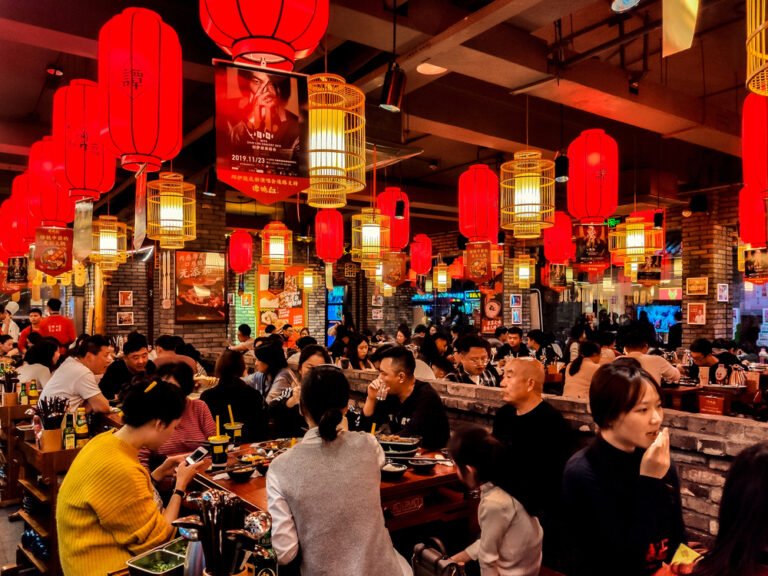
41. 饭店 (fàndiàn) — Restaurant
When hunger strikes, this phrase will guide you to culinary bliss.
中午不做饭,去饭店吃吧?
Zhōngwǔ bù zuò fàn, qù fàndiàn chī ba?
Let’s not cook lunch. Let’s go eat at a restaurant.
42. 菜单 (càidān) — Menu
Get ready to tantalize your taste buds by perusing the menu.
麻烦给我一份菜单看看。
Máfan gěi wǒ yī fèn càidān kàn kàn.
Could you give me a menu please?
43. 我要点这个 (wǒ yào diǎn zhège) — I’ll have this one
Point at the dish you desire and utter this phrase to satisfy your cravings.
你好,我要点这个招牌菜,谢谢。
Nǐ hǎo, wǒ yàodiǎn zhège zhāopái cài, xièxiè.
Hi, I’d like to order this signature dish, thank you.
44. 筷子 (kuàizi) — Chopsticks
Master the art of chopstick manipulation for an authentic dining experience.
中国人都习惯用筷子吃饭夹菜。
Zhōngguó rén dōu xíguàn yòng kuàizi chīfàn jiā cài.
Chinese people are accustomed to using chopsticks to eat and pick up vegetables.
45. 饺子 (jiǎozi) — Dumplings
Taste the mouthwatering pockets of joy that are synonymous with Chinese cuisine.
你喜欢吃什么馅的饺子呢?
Nǐ xǐhuān chī shénme xiàn de jiǎozi ní?
What kind of dumplings do you like to eat?
46. 炒饭 (chǎofàn) — Fried rice
A staple dish that will keep you fueled throughout your journey.
老板,麻烦给我来一份炒饭。
Lǎobǎn, máfan gěi wǒ lái yī fèn chǎofàn.
Boss, please bring me a piece of fried rice.
47. 面条 (miàntiáo) — Noodles
From street—side stalls to upscale restaurants, noodles are a must—try in China.
中午我就吃了一碗面条。
Zhōngwǔ wǒ jiù chīle yī wǎn miàntiáo.
I had a bowl of noodles at noon.
48. 辣 (là) — Spicy
Embrace the heat and prepare your taste buds for a fiery adventure.
这个辣椒炒肉太辣了。
Zhège làjiāo chǎo ròu tài làle.
This chili fried pork is too spicy.
49. 饮料 (yǐnliào) — Beverage
Quench your thirst with a refreshing drink to complement your meal.
我不喜欢喝饮料,喜欢喝温开水。
Wǒ bù xǐhuān hē yǐnliào, xǐhuān hē wēn kāishuǐ.
I don’t like to drink beverages. I like to drink warm water.
50. 请给我账单 (qǐng gěi wǒ zhàngdān) — Please bring me the bill
Time to settle the score and wrap up a delightful meal.
请给我账单,我需要仔细核对。
Qǐng gěi wǒ zhàngdān, wǒ xūyào zǐxì héduì.
Please give me the bill, I need to check it carefully.
Related Reading: How to Order Chinese Food in a Chinese Restaurant
Shopping and bargaining
Ready to unleash your inner shopaholic? In this section, we’ll embark on a shopping spree through the bustling markets of China. Learn how to navigate stores, ask for prices, and master the art of bargaining like a pro. From souvenirs to fashion finds, you’ll become a savvy shopper and snag the best deals while immersing yourself in the vibrant shopping culture of China.
51. 商店 (shāngdiàn) — Shop/store
Explore the diverse world of shopping in China.
我喜欢去楼下的商店买东西。
Wǒ xǐhuān qù lóu xià de shāngdiàn mǎi dōngxī.
I like to go to the store downstairs to buy things.
52. 多少钱 (duōshao qián) — How much is it?
Unleash your bargaining skills with this key question.
请问这辆自行车多少钱?
Qǐngwèn zhè liàng zìxíngchē duōshǎo qián?
How much does this bike cost?
53. 太贵了 (tài guì le) — Too expensive
When you need to let the vendor know that their initial price is out of your budget.
现在的房子太贵了,很多人买不起。
Xiànzài de fángzi tài guìle, hěnduō rén mǎi bù qǐ.
Nowadays, houses are too expensive and many can’t afford them.

54. 便宜一点 (piányi yìdiǎn) — Cheaper, please
Bargaining 101 — politely ask for a lower price.
老板,这件衣服可以便宜一点吗?
Lǎobǎn, zhè jiàn yīfú kěyǐ piányí yīdiǎn ma?
Boss, can this dress be cheaper?
55. 我要买这个 (wǒ yào mǎi zhège) — I want to buy this
Express your desire to own that beautiful souvenir or stylish garment.
妈妈,我要买这个玩具。
Māmā, wǒ yāomǎi zhège wánjù.
Mom, I want to buy this toy.
56. 大小 (dàxiǎo) — Size
Ensure a perfect fit by mastering this essential word.
这件衣服的大小更好适合你。
Zhè jiàn yīfú de dàxiǎo gèng hǎo shìhé nǐ.
The size of this dress suits you better.
57. 有没有打折 (yǒu méiyǒu dǎzhé) — Is there a discount?
Discover the world of sales and discounts in Chinese markets.
儿童买飞机票有没有打折的?
Értóng mǎi fēijī piào yǒu méiyǒu dǎzhé de?
Are there any discounts on air tickets for children?
58. 我可以试一下吗 (wǒ kěyǐ shì yíxià ma) — Can I try this on?
Don’t be shy — ask to try on that trendy outfit and unleash your inner fashionista.
这条裙子我可以试一下吗?
Zhè tiáo qúnzi wǒ kěyǐ shì yīxià ma?
Can I try on this skirt?
59. 这是真的吗 (zhè shì zhēn de ma) — Is this real?
Make sure you’re getting an authentic product by asking this crucial question.
网上说你已经结婚了,这是真的吗?
Wǎngshàng shuō nǐ yǐjīng jiéhūnle, zhè shì zhēn de ma?
It says online that you are married. Is this true?
60. 谢谢,我会考虑的 (xièxiè, wǒ huì kǎolǜ de) — Thank you, I’ll think about it
Master the art of gracefully declining and keeping your options open.
我们学校在招中文老师,你有兴趣了解一下吗?
Wǒmen xuéxiào zài zhāo zhōngwén lǎoshī, nǐ yǒu xìngqù liǎo jiè yīxià ma?
Our school is recruiting Chinese teachers. Are you interested in finding out?
谢谢,我会考虑的,明天给你答复。
Xièxiè, wǒ huì kǎolǜ de, míngtiān gěi nǐ dáfù.
Thank you, I will consider it and get back to you tomorrow.
Related Reading: Can You Learn Chinese In 5 Minutes?
Weather and seasons
From sunny skies to snow-covered landscapes, the weather sets the stage for every adventure. In this section, we’ll explore how to talk about the weather and express our affinity for each season. Whether you’re enjoying the warmth of summer or reveling in the magic of a winter wonderland, you’ll have the phrases to connect with nature and stay prepared for any weather forecast.
61. 天气 (tiānqì) — Weather
Strike up conversations about the ever-changing atmospheric conditions.
今天天气真好,适合出游。
Jīntiān tiānqì zhēn hǎo, shìhé chūyóu.
The weather is really nice today, suitable for traveling.
62. 夏天 (xiàtiān) — Summer
Embrace the warmth and soak up the summer vibes.
对我来说,夏天的味道就是西瓜。
Duì wǒ lái shuō, xiàtiān de wèidào jiùshì xīguā.
To me, the flavor of summer is watermelon.
63. 冬天 (dōngtiān) — Winter
Bundle up and explore the winter wonderland that China becomes.
寒冷的冬天最合适吃火锅。
Hánlěng de dōngtiān zuì héshì chī huǒguō.
The cold winter is the best time to eat hot pot.
64. 春天 (chūntiān) — Spring
Witness the rebirth of nature and immerse yourself in the beauty of blooming flowers.
春天,万物复苏的开始。
Chūntiān, wànwù fùsū de kāishǐ.
Spring marks the renewal of all things.

65. 秋天 (qiūtiān) — Autumn/Fall
Be captivated by the breathtaking colors of fall foliage.
秋天,丰收的季节。
Qiūtiān, fēngshōu de jìjié.
Autumn, the season of harvest.
66. 晴天 (qíngtiān) — Sunny day
The perfect weather to explore outdoor attractions and enjoy a picnic.
大晴天就适合晒被子。
Dà qíngtiān jiù shìhé shài bèizi.
Sunny days are great for drying a quilt.
67. 阴天 (yīntiān) — Cloudy day
When the sun decides to take a break, the clouds set the stage for a cozy day indoors.
连着几天的阴天,真让人讨厌。
Liánzhe jǐ tiān de yīn tiān, zhēn ràng rén tǎoyàn.
It’s been cloudy for a few days now. How annoying.
68. 下雨 (xiàyǔ) — It’s raining
Don’t let the rain dampen your spirits; embrace the beauty of a rainy day.
沙沙沙,下雨的声音真好听。
Shāshā shā, xià yǔ de shēngyīn zhēn hǎotīng.
The rustling sound of rain is soothing.
69. 刮风 (guāfēng) — It’s windy
Hold on tight to your hat, or you might just find it floating away!
不管刮风还是下雨,我都要准时上班。
Bùguǎn guā fēng háishì xià yǔ, wǒ dū yào zhǔnshí shàngbān.
I’ve to get to work on time even if it’s windy or raining.
70. 雪 (xuě) — Snow
Experience the magic of a snowy day and create lifelong memories.
窗外一片白茫茫,雪还在继续下。
Chuāngwài yīpiàn bái mángmáng, xuě hái zài jìxù xià.
It was completely white outside the window as the snow kept on falling.
Related Reading: How to Speak Chinese?
Time and days of the week
Tick-tock, time is of the essence! In this section, we’ll dive into the world of timekeeping and days of the week. From asking for the time to scheduling appointments, you’ll learn how to navigate daily routines and stay organized. Let’s go over the basic Chinese words for days of the week, embrace the present moment, mark our calendars, and make the most of every day.
71. 时间 (shíjiān) — Time
Keep track of your schedule and appointments with this vital word.
时间真的存在吗?
Shíjiān zhēn de cúnzài ma?
Does time really exist?
72. 星期几 (xīngqī jǐ) — What day is it?
Never miss a beat by staying on top of the current day.
今天星期几?
Jīntiān xīngqí jǐ?
What day of the week is it today?
今天星期四。
Jīntiān xīngqísì.
It’s Thursday today.
73. 今天 (jīntiān) — Today
Embrace the present and make the most of every moment.
好的习惯就是今天事情,今天完成。
Hǎo de xíguàn jiùshì jīntiān shìqíng, jīntiān wánchéng.
A good habit is to finish today’s tasks, today.
74. 昨天 (zuótiān) — Yesterday
Reflect on past adventures and memories.
昨天已成过去,只剩回忆。
Zuótiān yǐ chéng guòqù, zhǐ shèng huíyì.
Yesterday is history, and only memories remain.
75. 明天 (míngtiān) — Tomorrow
Stay excited about the endless possibilities that tomorrow brings.
从明天开始,做个幸福的人。
Cóng míngtiān kāishǐ, zuò gè xìngfú de rén.
I’ll be a happy person from tomorrow onwards.
76. 周一 (zhōuyī) — Monday
Kickstart your week with energy and enthusiasm.
周一,奄奄一息。
Zhōuyī, yǎnyānyīxī.
Mondays, so full of dread.
77. 周二 (zhōuèr) — Tuesday
Say goodbye to Monday blues and keep the momentum going.
周二的会议取消了。
Zhōu’èr de huìyì qǔxiāole.
Tuesday’s meeting was canceled.
78. 周三 (zhōusān) — Wednesday
Find your midweek groove and stay focused on your goals.
周三,无心搬砖。
Zhōusān, wúxīn bān zhuān.
Slogging along on a Wednesday.
79. 周四 (zhōusì) — Thursday
The bridge between midweek and the upcoming weekend.
周四,摸鱼度日。
Zhōu sì, mō yú dù rì.
Skiving on a Thursday.
80. 周五 (zhōuwǔ) — Friday
Feel the anticipation in the air as the weekend draws near.
周五,生龙活虎。
Zhōu wǔ, shēnglónghuóhǔ.
Full of energy on a Friday.
Related Reading: Making Sense of Chinese Words
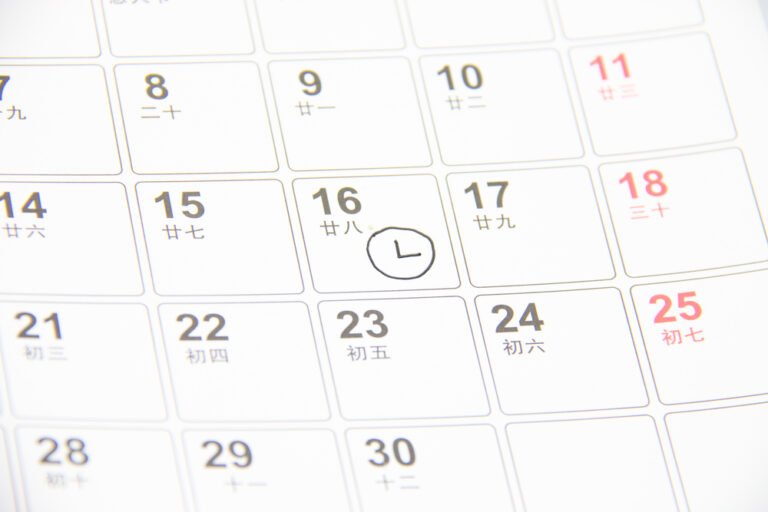
Emergency phrases
Safety first! In this section, we’ll equip you with the basic Chinese phrases to handle emergencies with confidence. From seeking medical help to reporting incidents, you’ll learn how to communicate your needs and ensure your well-being. So, rest assured knowing that you’re prepared to handle unexpected situations and seek assistance when needed.
81. 帮助 (bāngzhù) — Help
When in distress, reach out for assistance with this powerful word.
这一次太谢谢你的帮助了。
Zhè yīcì tài xièxiè nǐ de bāngzhùle.
Thanks for your help this time.
82. 医院 (yīyuàn) — Hospital
Stay prepared for unforeseen circumstances by knowing the location of the nearest
medical facility.
我在医院上班。
Wǒ zài yīyuàn shàngbān.
I work at a hospital.
83. 警察 (jǐngchá) — Police
In case of emergencies or incidents, the police can provide the necessary support.
有困难找警察。
Yǒu kùnnán zhǎo jǐngchá.
If you have trouble, contact the police.
84. 火灾 (huǒzāi) — Fire
Be alert and ready to report any fire-related incidents promptly.
发现火灾,第一时间报警。
Fāxiàn huǒzāi, dì yī shíjiān bàojǐng.
If you spot a fire, call the police right away.
85. 危险 (wēixiǎn) — Danger
Stay cautious and aware of your surroundings to ensure your safety.
独自旅游,危险吗?
Dúzì lǚyóu, wéixiǎn ma?
Is it dangerous to travel alone?
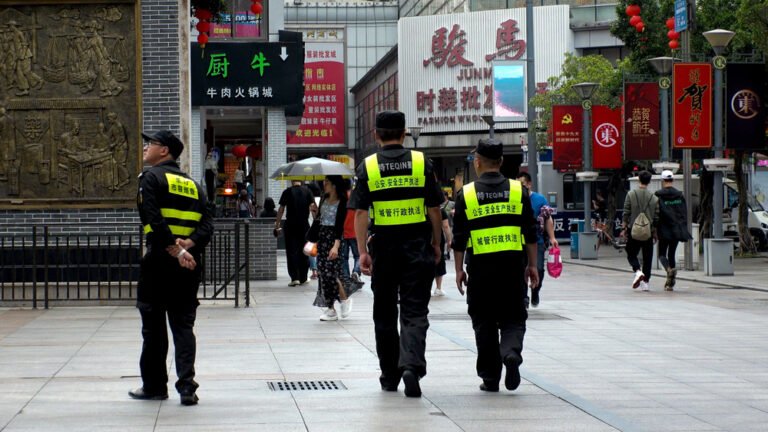
86. 我丢失了我的包 (wǒ diūshī le wǒ de bāo) — I lost my bag
Don’t panic if you misplace your belongings; this phrase will come to your rescue.
一不注意,我丢失了我的包,里面有我的身份证。
Yī bù zhùyì, wǒ diūshīle wǒ de bāo, lǐmiàn yǒu wǒ de shēnfèn zhèng.
In a moment of carelessness, I lost my bag which contains my ID.
87. 医疗急救 (yīliáo jíjiù) — Medical emergency
When immediate medical attention is required, communicate this urgency clearly.
这些医疗急救的常识,你记住了吗?
Zhèxiē yīliáo jíjiù de chángshì, nǐ jì zhùle ma?
Do you remember these common sense medical emergency tips?
88. 抢劫 (qiǎngjié) — Robbery
Though we hope you never need to use this phrase, it’s essential to be prepared.
竟然还有人去银行抢劫,这是多想不开啊?
Jìngrán hái yǒurén qù yínháng qiǎngjié, zhè shì duō xiǎngbùkāi a?
To think there are still people who rob banks, how crazy is that?
89. 我需要报警 (wǒ xūyào bàojǐng) — I need to call the police
When situations require the intervention of law enforcement, this phrase will ensure prompt action.
无缘无故被人打了,我需要报警。
Wúyuán wúgù bèi rén dǎle, wǒ xūyào bàojǐng.
I was assaulted for no reason. I need to call the police.
90. 糟糕 (zāogāo) — Oh no!/Oops!
A versatile exclamation to express surprise, disappointment, or minor mishaps.
风雨交加的天气,真是太糟糕了。
Fēngyǔ jiāojiā de tiānqì, zhēnshi tài zāogāole.
The weather’s really bad with the wind and rain.
Related Reading: How Many Mandarin Words Do I Need To Learn To Be Fluent?
Expressions and fun phrases
Language isn’t just about practicality — it’s about connection and expression. In this section, we’ll explore a collection of fun phrases and expressions that will help you connect with locals and add flair to your conversations. From compliments to invitations, you’ll master the art of expressing yourself and leave a lasting impression as you embrace the richness of Mandarin Chinese.
91. 加油 (jiāyóu) — Let’s go!/Keep it up!
Cheer on yourself or others with this motivational phrase.
继续加油,你是最棒的!
Jìxù jiāyóu, nǐ shì zuì bàng de!
Keep it up! You’re the best!
92. 恭喜发财 (gōngxǐ fācái) — Congratulations and prosperity!
Wish others well and spread the joy.
恭喜发财,红包拿来。
Gōngxǐ fācái, hóngbāo ná lái.
I wish you great wealth! Now, please give me a red packet.
93. 祝你生日快乐 (zhù nǐ shēngrì kuàilè) — Happy birthday to you!
Celebrate special occasions with this festive phrase. And check out all you need to know about Chinese birthdays for more birthday fun.
爸爸,祝你生日快乐!
Bàba, zhù nǐ shēngrì kuàilè!
Happy birthday, Dad!
老公,祝你生日快乐。
Lǎogōng, zhù nǐ shēngrì kuàilè.
Happy birthday to you, husband.

94. 祝你好运 (zhù nǐ hǎoyùn) — Good luck to you!
Boost the morale of your friends and loved ones with this supportive expression.
你明天考试了,祝你好运。
Nǐ míngtiān kǎoshìle, zhù nǐ hǎo yùn.
You have an exam tomorrow, so I wish you good luck.
成绩快公布了,祝你好运!
Chéngjī kuài gōngbùle, zhù nǐ hǎo yùn!
The results will be announced soon! I wish you good luck!
95. 祝你旅途愉快 (zhù nǐ lǚtú yúkuài) — Have a pleasant journey!
Bid farewell to fellow travelers with this kind wish.
快上车吧,祝你旅途愉快。
Kuài shàng chē ba, zhù nǐ lǚtú yúkuài.
Go on, get on board, and have a pleasant journey.
96. 有空我们一起出去玩吧 (yǒu kòng wǒmen yìqǐ chūqù wán ba) — Let’s hang out when we’re free!
Make plans and nurture new friendships with this fun invitation.
很高兴认识你,有空我们一起出去玩吧!
Hěn gāoxìng rènshí nǐ, yǒu kòng wǒmen yīqǐ chūqù wán ba!
Pleasure to meet you! Let’s hang out when we’re free!
97. 你真棒 (nǐ zhēn bàng) — You’re awesome!
Boost someone’s self-esteem with this powerful compliment.
你真棒,什么都懂。
Nǐ zhēn bàng, shénme dōu dǒng.
You’re awesome! You know everything.
小明,你真棒,学得好快!
Xiǎomíng, nǐ zhēn bàng, xué dé hǎo kuài!
Xiaoming, you’re awesome! You learn so fast!
98. 我爱你 (wǒ ài nǐ) — I love you
Express your affection and deepen your bonds with this heartfelt phrase. There’s a whole new level of confidence you gain when you learn how to express your love in Chinese!
老婆,我爱你。
Lǎopó, wǒ ài nǐ.
My dear wife, I love you.
老公,我也爱你。
Lǎogōng, wǒ yě ài nǐ.
My dear husband, I love you too.
99. 你是我的朋友 (nǐ shì wǒ de péngyǒu) — You are my friend
Celebrate friendship and let your pals know they’re cherished.
不用谢,因为你是我的朋友。
Bùyòng xiè, yīnwèi nǐ shì wǒ de péngyǒu.
You’re welcome, because you are nmy friend.
100. 谢谢,我会记住你的帮助 (xièxiè, wǒ huì jìzhu nǐ de bāngzhù) — Thank you, I will remember your help
Express gratitude and assure others that their kindness won’t be forgotten.
谢谢你帮我搬家,我会记住你的帮助。
Xièxiè nǐ bāng wǒ bānjiā, wǒ huì jì zhù nǐ de bāngzhù.
Thank you for helping me move, I will remember your help.
Related Reading: The Definitive Guide to Chinese Proverbs, Sayings, and Quotes
Colors
Get ready to paint your world with vibrant hues! In this section, we’ll explore the beautiful spectrum of colors in Mandarin Chinese. From fiery red to serene blue, we’ll delve into the meanings and associations behind each shade. Discover how colors play a significant role in Chinese culture and language as we unlock the secrets of the rainbow.
101. 红色 (hóngsè) — Red
The color of passion and luck.
我有一件红色的外套。
Wǒ yǒuyī jiàn hóngsè de wàitào.
I have a red jacket.
102. 蓝色 (lánsè) — Blue
Symbolizing tranquility and calmness.
蓝色的天空上飘来了一朵白云。
Lán sè de tiānkōng shàng piāo láile yī duǒ báiyún.
A white cloud floated by on the blue skies.
103. 黄色 (huángsè) — Yellow
Associated with sunshine and happiness.
她送给我一条黄色的毛巾。
Tā sòng gěi wǒ yītiáo huángsè de máojīn.
She gave me a yellow towel.
104. 绿色 (lǜsè) — Green
The color of nature and growth.
窗外一片绿色,好养眼。
Chuāngwài yīpiàn lǜsè, hǎo yǎngyǎn.
The green outdoors through the window is so refreshing.
105. 紫色 (zǐsè) — Purple
Representing royalty and elegance.
紫色的葡萄比较甜。
Zǐsè de pútáo bǐjiào tián.
Purple grapes are sweeter.
106. 橙色 (chéngsè) — Orange
Vibrant and energetic, just like the fruit.
我的那件橙色外套不见了。
Wǒ dì nà jiàn chéngsè wàitào bùjiànle.
My orange jacket is gone.
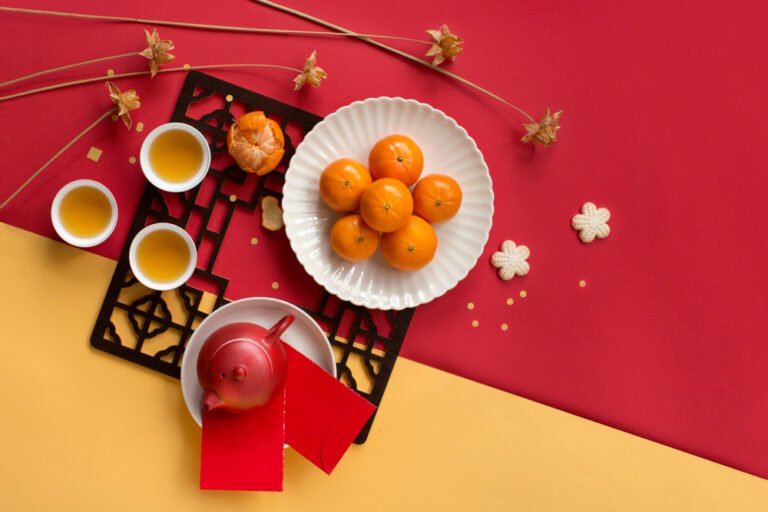
107. 粉色 (fěnsè) — Pink
Often associated with sweetness and femininity.
我家孩子喜欢穿粉色的裙子。
Wǒjiā háizi xǐhuān chuān fěnsè de qúnzi.
My child loves to wear pink skirts.
108. 黑色 (hēisè) — Black
Symbolizing mystery and sophistication.
中国人的头发一般是黑色的。
Zhōngguó rén de tóufǎ yībān shì hēisè de.
Chinese people usually have black-colored hair.
109. 白色 (báisè) — White
Signifying purity and simplicity.
白色的墙,灰色的瓦。
Báisè de qiáng, huīsè de wǎ.
White walls, gray tiles.
110. 颜色 (yánsè) — Color
Use this word to talk about any color you encounter.
你喜欢什么样的颜色?
Nǐ xǐhuān shénme yàng de yánsè?
What color do you like?
Emotions and feelings
Emotions are the kaleidoscope of our inner world, and expressing them is a universal language. In this section, we’ll dive into the realm of emotions and feelings in Mandarin Chinese. Whether you’re feeling ecstatic, melancholic, or somewhere in between, we’ll equip you with the vocabulary to accurately convey your emotions. Get ready to embrace the rollercoaster ride of human sentiment and connect with others on a deeper level.
111. 开心 (kāixīn) — Happy
When your heart is filled with joy and delight.
今天我的好朋友要来看我,我实在太开心了。
Jīntiān wǒ de hǎo péngyǒu yào lái kàn wǒ, wǒ shízài tài kāixīnle.
My pals are coming to visit me today. I’m so happy!
112. 难过 (nánguò) — Sad
When you’re feeling down or experiencing sorrow.
小狗丢了,我感觉很难过。
Xiǎo gǒu diūle, wǒ gǎnjué hěn nánguò.
I’m so sad that my puppy is lost.

113. 激动 (jīdòng) — Excited
That exhilarating feeling of anticipation and enthusiasm.
怀着激动的心情,我搬进了新家。
Huáizhe jīdòng de xīnqíng, wǒ bān jìnle xīnjiā.
Full of excitement, I moved into my new home.
114. 紧张 (jǐnzhāng) — Nervous
When butterflies start fluttering in your stomach.
面对心爱的女孩子,他有点紧张。
Miàn duì xīn’ài de nǚ háizi, tā yǒudiǎn jǐnzhāng.
He was a little nervous in front of the girl he loved.
115. 生气 (shēngqì) — Angry
When frustration gets the best of you.
他甩上门,生气地走了。
Tā shuǎi shàngmén, shēngqì de zǒule.
He slammed the door and left angrily.
116. 害怕 (hàipà) — Scared
That feeling of fear or unease creeping in.
我害怕一个人睡觉。
Wǒ hàipà yīgè rén shuìjiào.
I’m afraid of sleeping alone.
117. 惊讶 (jīngyà) — Surprised
When something catches you off guard and leaves you in awe.
听到公司裁员的消息,我们都感到很惊讶。
Tīng dào gōngsī cáiyuán de xiāoxī, wǒmen dōu gǎndào hěn jīngyà.
We were all surprised to hear about the company’s layoffs.
118. 平静 (píngjìng) — Calm
The serenity that washes over you in peaceful moments.
知道自己考了100分后,他的心情久久不能平静。
Zhīdào zìjǐ kǎole 100 fēn hòu, tā de xīnqíng jiǔjiǔ bùnéng píngjìng.
He couldn’t stay calm after knowing that he had scored 100 points in the exam.
119. 感激 (gǎnjī) — Grateful
The warm and thankful feeling that fills your heart.
老板又涨我工资了,让我心里充满感激。
Lǎobǎn yòu zhǎng wǒ gōngzīle, ràng wǒ xīnlǐ chōngmǎn gǎnjī.
I’m so grateful to my boss for increasing my salary again.
120. 累 (lèi) — Tired
When you’re in need of a good rest and some relaxation.
上了一天的班,我感觉很累。
Shàngle yītiān de bān, wǒ gǎnjué hěn lèi.
After a day’s work, I feel very tired.
Related Reading: The Ultimate Guide to Learning Chinese Online
Embrace the power of Mandarin Chinese and unleash your linguistic superpowers
Congratulations, intrepid language learners! You’ve made it to the end of our thrilling journey through 120 basic Chinese words and phrases. With this newfound knowledge, you’ll be able to survive and thrive in China with confidence.
Remember, language learning is not just about words; it’s about building bridges, embracing culture, and forging meaningful connections. So go forth, explore, and immerse yourself in the rich tapestry of Mandarin Chinese. 加油 (jiāyóu)!
Fast-track your Mandarin fluency with our FREE Webclass!
Join us and learn how to speak fluent Chinese three times faster than a full-time student without the stress or the hefty price tag. Uncover three secrets that make Mandarin fluency easy, fast, and fun! Register now and save your seat for this game-changing webclass.








